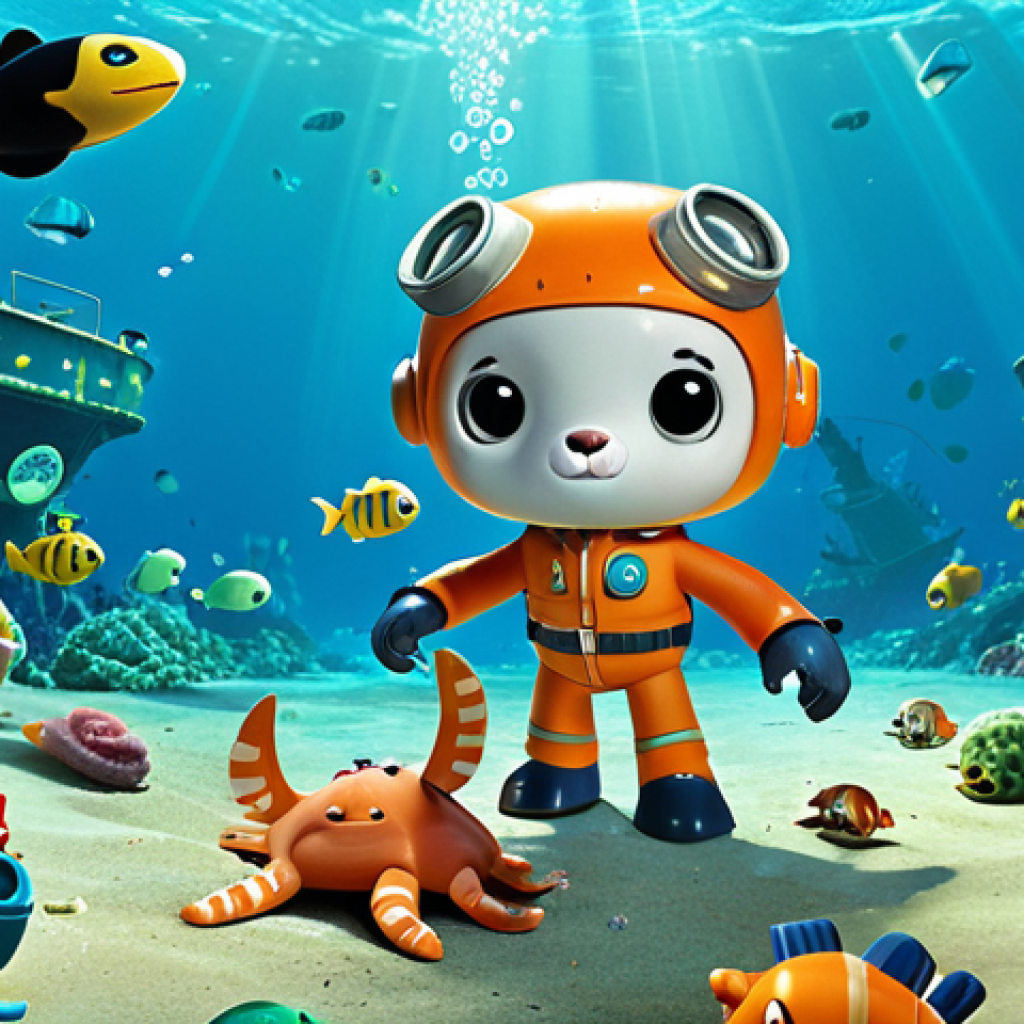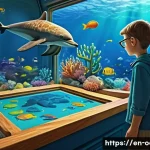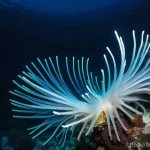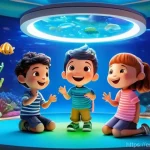Dive into the enchanting world of the Octonauts, where underwater adventures meet environmental stewardship! As a parent, I’ve always sought engaging ways to teach my kids about protecting our planet, and the Octonauts have proven to be a fantastic tool.
They spark conversations about marine life and the importance of conservation in a way that’s both fun and accessible. What I’ve noticed is how the Octonauts are increasingly addressing real-world environmental concerns like plastic pollution and coral reef degradation, reflecting a growing trend in children’s media to promote eco-consciousness.
Looking ahead, I predict we’ll see even more interactive and immersive educational experiences that combine entertainment with tangible environmental action.
This is not just a trend; it’s a necessary shift to engage the next generation of environmental stewards. Let’s explore the Octonauts’ environmental campaigns in detail below!
Octonauts’ Adventures in Plastic Patrol
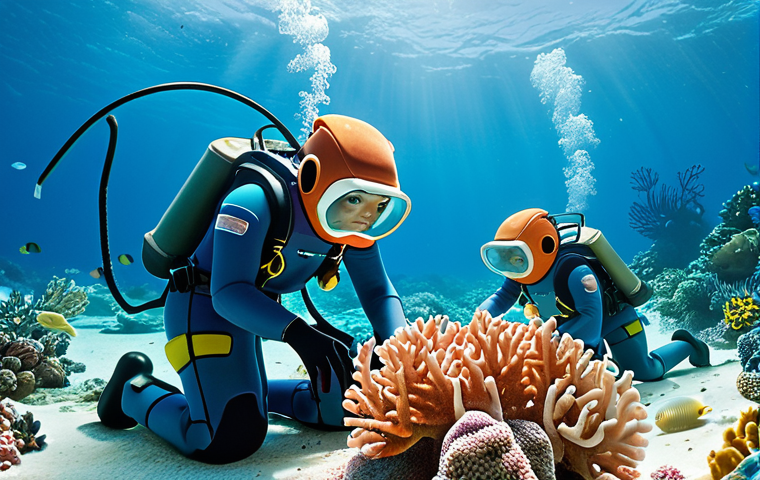
Tackling the Trash Vortex
One of the most impactful ways the Octonauts address environmental issues is through their adventures dealing with plastic pollution. I remember watching an episode with my daughter where the Octonauts encountered a massive “trash vortex” – a swirling heap of plastic debris endangering marine life. It really opened her eyes to the scale of the problem. The episode showed them carefully collecting and sorting the trash, rescuing animals tangled in plastic, and educating other creatures about the dangers of littering. It wasn’t just a cleanup; it was a lesson in responsibility.
The Microplastic Menace
Beyond the large, visible pieces of plastic, the Octonauts also delve into the issue of microplastics. These tiny particles, often invisible to the naked eye, can be ingested by marine animals, causing serious health problems. I was particularly impressed by an episode where they used specialized equipment to filter microplastics from the water, highlighting the technological solutions being developed to combat this problem. The show explained how these microplastics end up in the food chain, affecting everything from tiny plankton to large whales. It made me realize how pervasive plastic pollution is and how important it is to reduce our reliance on single-use plastics.
Promoting Reusable Alternatives
The Octonauts don’t just focus on the problem; they actively promote solutions. They often showcase reusable alternatives to plastic products, such as reusable water bottles, bags, and containers. I’ve noticed my kids are more enthusiastic about using their own reusable items after watching the show. They also demonstrate the importance of recycling and proper waste disposal, emphasizing that every little action can make a difference. I think that’s a great message for kids: even small changes can have a big impact.
Coral Reef Rescue Missions
Understanding Coral Bleaching
Coral reefs are vital ecosystems, often referred to as the “rainforests of the sea.” The Octonauts tackle the issue of coral bleaching head-on, explaining how rising ocean temperatures and pollution are causing coral to lose its vibrant colors and die. I remember one episode where they used a special submersible to study a bleached coral reef, showing the stark contrast between healthy and unhealthy coral. The episode explained the symbiotic relationship between coral and algae, and how changes in water conditions disrupt this relationship, leading to bleaching. It was a powerful visual representation of the impact of climate change on marine life.
Rehabilitating Damaged Reefs
The Octonauts aren’t just observers; they’re active participants in coral reef restoration. They often work with marine biologists to transplant healthy coral fragments onto damaged reefs, helping to rebuild these vital ecosystems. They also address the issue of destructive fishing practices, such as dynamite fishing, which can decimate coral reefs. I’ve seen episodes where they educate local fishermen about sustainable fishing methods, promoting practices that protect the reef. It’s inspiring to see them taking concrete action to restore these underwater habitats.
The Importance of Biodiversity
The Octonauts emphasize the importance of biodiversity in coral reefs, highlighting the interconnectedness of all the species that live there. They showcase the diverse array of creatures that depend on coral reefs for food and shelter, from colorful fish to sea turtles to invertebrates. I’ve learned so much about the intricate relationships within these ecosystems from watching the show with my kids. They explain how the loss of coral reefs can have cascading effects on the entire marine environment. It’s a reminder that protecting coral reefs is essential for maintaining the health of our oceans.
Protecting Endangered Species with the Octonauts
Rescuing Sea Turtles
Sea turtles, often victims of entanglement in fishing gear and plastic pollution, are frequent subjects of Octonauts rescue missions. I’ve watched episodes where they carefully remove plastic from a sea turtle’s flipper and transport injured turtles to rehabilitation centers. The show highlights the threats that sea turtles face, such as habitat destruction and poaching, and emphasizes the importance of protecting their nesting grounds. It’s heartening to see the Octonauts working to ensure the survival of these ancient creatures.
Saving Whales and Dolphins
Whales and dolphins, intelligent and majestic marine mammals, also face numerous threats, including entanglement in fishing nets, ship strikes, and noise pollution. The Octonauts often assist whales and dolphins in distress, disentangling them from nets and providing medical assistance. They also address the issue of noise pollution, explaining how loud sounds can disrupt whale communication and navigation. I was particularly moved by an episode where they used sonar technology to help a pod of whales find a safe migration route. It’s a reminder that we need to be mindful of the impact of our activities on these magnificent animals.
Conserving Marine Habitats
The Octonauts emphasize the importance of conserving marine habitats, such as mangrove forests and seagrass beds, which provide essential breeding grounds and nurseries for many marine species. They explain how these habitats are threatened by coastal development, pollution, and climate change. I’ve seen episodes where they work to restore damaged mangrove forests and seagrass beds, planting new seedlings and removing debris. It’s a reminder that protecting these habitats is essential for the survival of many marine species.
Octonauts’ Educational Initiatives
Interactive Learning Modules
Beyond the animated series, the Octonauts offer a range of interactive learning modules designed to reinforce environmental concepts. These modules often include games, quizzes, and activities that allow children to test their knowledge and learn more about marine life and conservation. I’ve found these modules to be a valuable supplement to the show, providing a more in-depth exploration of the topics covered in the episodes. They also encourage critical thinking and problem-solving skills.
Classroom Resources
The Octonauts provide a variety of classroom resources for teachers, including lesson plans, activity sheets, and videos. These resources are designed to help educators integrate environmental education into their curriculum. I’ve seen teachers use Octonauts episodes as a starting point for discussions about marine life, pollution, and conservation. The show’s engaging characters and storylines make it an effective tool for teaching these important concepts.
Community Outreach Programs
The Octonauts have partnered with various environmental organizations to conduct community outreach programs, such as beach cleanups and educational workshops. These programs aim to raise awareness about environmental issues and encourage people to take action. I’ve attended a few Octonauts-sponsored beach cleanups with my kids, and they’ve been a great way to get involved in our local community and make a tangible difference. It’s inspiring to see the Octonauts using their platform to promote environmental stewardship.
Sustainable Practices Modeled by the Octonauts
Energy Conservation
The Octopod, the Octonauts’ underwater base, is designed to be energy-efficient, utilizing renewable energy sources such as solar and hydro power. The show often highlights the importance of conserving energy, showing the Octonauts turning off lights when they leave a room and using energy-efficient equipment. I’ve noticed my kids are more mindful of conserving energy at home after watching the show, reminding me to turn off lights and unplug electronic devices when they’re not in use. It’s a reminder that even small actions can make a big difference in reducing our carbon footprint.
Waste Reduction
The Octonauts actively promote waste reduction, emphasizing the importance of recycling, composting, and reducing our reliance on single-use plastics. They often showcase creative ways to reuse and repurpose materials, such as turning old plastic bottles into planters. I’ve been inspired to adopt more sustainable practices at home, such as composting food scraps and using reusable shopping bags. The show has helped me realize that waste reduction is not just about recycling; it’s about rethinking our consumption habits and finding ways to minimize our impact on the environment.
Responsible Resource Management
The Octonauts demonstrate responsible resource management, emphasizing the importance of using resources wisely and avoiding waste. They often highlight the importance of conserving water, showing the Octonauts using water-efficient equipment and avoiding unnecessary water usage. I’ve become more mindful of my water consumption at home, taking shorter showers and fixing leaky faucets. The show has helped me realize that responsible resource management is essential for ensuring the long-term health of our planet.
The Future of Environmental Education with the Octonauts
Augmented Reality Experiences
Imagine exploring a coral reef with the Octonauts using augmented reality technology. This could allow children to interact with virtual marine animals and learn about their habitats in a fun and engaging way. I envision augmented reality experiences that would allow children to virtually clean up plastic pollution or rehabilitate damaged coral reefs. These immersive experiences would make learning about environmental issues more interactive and memorable.
Personalized Learning Paths
Personalized learning paths could allow children to focus on the environmental topics that interest them most. For example, a child who is passionate about sea turtles could explore interactive modules and games that focus specifically on sea turtle conservation. These personalized learning paths would cater to individual learning styles and interests, making environmental education more effective and engaging.
Global Collaboration Projects
The Octonauts could facilitate global collaboration projects, connecting children from different countries to work together on environmental initiatives. These projects could involve sharing data about local environmental issues, developing solutions to common problems, and implementing conservation projects in their communities. I believe that global collaboration projects would foster a sense of shared responsibility for the environment and empower children to become global environmental leaders.
| Environmental Issue | Octonauts’ Approach | Real-World Application |
|---|---|---|
| Plastic Pollution | Cleaning up trash vortices, filtering microplastics, promoting reusable alternatives | Participating in local cleanups, reducing single-use plastic consumption |
| Coral Bleaching | Studying damaged reefs, transplanting healthy coral, educating about biodiversity | Supporting coral reef conservation organizations, reducing carbon footprint |
| Endangered Species | Rescuing sea turtles, saving whales and dolphins, conserving marine habitats | Supporting wildlife conservation efforts, protecting marine habitats |
| Energy Consumption | Using renewable energy sources, conserving energy, promoting energy efficiency | Conserving electricity at home, utilizing renewable energy sources |
| Waste Management | Reducing reliance on single-use items, promote re-use of old items, composting | Composting at home, reducing reliance on single-use items, donating instead of throwing away |
The Octonauts aren’t just entertaining; they’re sparking a crucial dialogue about environmental responsibility with our kids. From their deep dives into plastic pollution to their heartwarming rescue missions, they’re teaching valuable lessons in a way that’s both engaging and accessible.
And who knows, maybe these little explorers will inspire a new generation of ocean heroes!
In Conclusion
The Octonauts offer a fantastic and engaging way to introduce children to critical environmental issues. Through their exciting adventures, they promote awareness and inspire action. By watching and learning alongside the Octonauts, kids can develop a sense of responsibility for our planet and its oceans. Perhaps, together, we can make a difference.
Useful Tips
1. Reduce Your Plastic Consumption: Opt for reusable water bottles, shopping bags, and food containers to minimize your plastic waste.
2. Participate in Local Cleanups: Join community-organized cleanups to help remove trash and debris from your local environment.
3. Support Sustainable Seafood Choices: Choose seafood that is sourced from sustainable fisheries to protect marine ecosystems.
4. Educate Others: Share what you’ve learned about environmental issues with friends and family to spread awareness and inspire action.
5. Conserve Energy: Turn off lights when you leave a room, unplug electronic devices when they’re not in use, and consider using renewable energy sources to reduce your carbon footprint.
Key Takeaways
The Octonauts effectively address environmental concerns by showcasing the impacts of plastic pollution, coral bleaching, and threats to endangered species. The series promotes sustainable practices such as energy conservation, waste reduction, and responsible resource management. Through interactive learning modules, classroom resources, and community outreach programs, the Octonauts inspire environmental stewardship in children and adults alike.
Frequently Asked Questions (FAQ) 📖
Q: How do the Octonauts actually educate kids about environmental issues?
A: From my experience, the Octonauts cleverly weave educational content into their adventures. My little ones learn about marine creatures and their habitats almost by osmosis!
They use catchy songs and visuals to explain complex issues like ocean acidification or the impact of oil spills. What I really appreciate is how they always offer solutions or demonstrate how kids themselves can make a difference, like reducing plastic use or protecting coral reefs.
It’s never preachy; it’s just a natural part of the story.
Q: Are the environmental problems the Octonauts tackle based on real-world science?
A: Absolutely! I’ve done a bit of digging myself, and it’s clear the creators do their homework. While it’s a cartoon, the show consults with marine biologists and other experts to ensure the issues they present are accurate and up-to-date.
For instance, when they showed the effects of plastic pollution on sea turtles, it mirrored real-life rescue efforts happening worldwide. It’s reassuring to know my kids are learning about genuine environmental challenges, even through an animated show.
It makes the lessons stick better.
Q: As a parent, what’s the biggest benefit you’ve seen from your kids watching the Octonauts?
A: Beyond the educational aspect, the biggest win for me has been seeing my children develop a genuine sense of empathy and responsibility towards the environment.
They’re more aware of their own actions and how they impact the planet. For example, my daughter now insists on bringing reusable bags to the grocery store, inspired by an Octonauts episode about reducing plastic waste.
That’s a tangible change, and it all started with a cartoon! It’s amazing how a show can foster that kind of awareness and inspire kids to become active environmental stewards.
📚 References
Wikipedia Encyclopedia
구글 검색 결과
구글 검색 결과
구글 검색 결과
구글 검색 결과
구글 검색 결과
